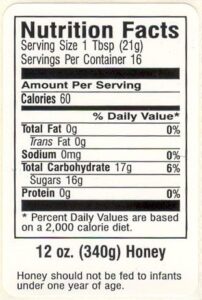Natural Honey is a highly concentrated or supersaturated solution of sugars from flower nectar gathered by honeybees. The complex flavors of local honey are a unique combination of the flora within a geographic location and the influences of climate and soil. Flower nectar is the treat or payment to bees provided by plants in trade for pollination. Honeybees drive off the water concentrating the nectar which accomplishes two major objectives of saving space and naturally creating a substance that protects the sugars from spoiling. This honey is placed into a matrix of storage cells made of wax called honeycomb mostly for future consumption in winter where the carbohydrates are essential for heat generation protecting the queen from the cold.
Honey Care: Pure honey is fairly resilient. To protect the delicate flavors of your honey store it at room temperature away from direct light in the pantry or cabinet to protect it from temperature fluctuations. Pure Honey will never spoil or need refrigeration; refrigeration may increase the natural crystallization process. Only pure natural honey will crystallize and can be made liquid again with gentle, slow warming however never warm above 95° F (35° C) as it will compromise the chemical composition actually making the honey susceptible to spoilage.
- [faq p=62974]
- [faq p=63033]
- [faq p=62997]
- [faq p=62933]
- [faq p=62995]
- [faq p=62936]
Here are the nutritional facts for our 12oz bears of honey.

- [faq p=63028]
- [faq p=63026]
- [faq p=62510]
- [faq p=62941]
Honey is a natural antibiotic and honey has been used for treating wounds throughout pre-history. Honey in modern medicine has been used to treat wounds. The natural properties of honey help clear infections and reduce inflammation, and may stimulate the re-growth of tissue according to some studies.
Because my honey is untreated, unheated, and unaltered, it may contain organisms that are naturally present in raw honey. Honey is a natural antibiotic and it is safe to eat raw honey, but the FDA advises that infants not be given raw honey. It should be heated first to kill any organisms. Some cultures feed newborn babies, honey, even before they are given milk. There is pasteurized honey that is available for this. Raw honey is not for infants.
Holistic Honey and Allergies
There are many claims about the holistic benefits of Honey. Honey has been claimed to slow aging, prevent hair loss, improve digestion and reduce hay fever symptoms. Some have these have been scientifically proven.
The connection between allergies and honey is that honey is made from the very things that cause hay fever. Bees collect Pollen and Nectar from trees and plants – all the things that make us sneeze. These are treated and altered inside the bee and turned into honey. Honey has small amounts of pollen proteins and other stuff of flowers.
It has been reasoned that these fragments of pollen proteins and complex carbohydrates can cause a tiny reaction in our bodies that will stimulate our systems to learn to tolerate the allergens.
Local honey is made from the local flowers that cause hay fever. In the Spring bees harvest the pollen of Maple, Oak, and other trees that cause Spring hay fever. In the Fall, bees harvest ragweed, goldenrod, and Queen Anne’s lace.
Eating local honey every day is supposed to be a kind of immunotherapy, not very different from the series of shots that an allergy doctor might give you to reduce reaction to allergens.
I have hay fever in the fall and I think that honey may have reduced my reactions, but it is hard to tell.